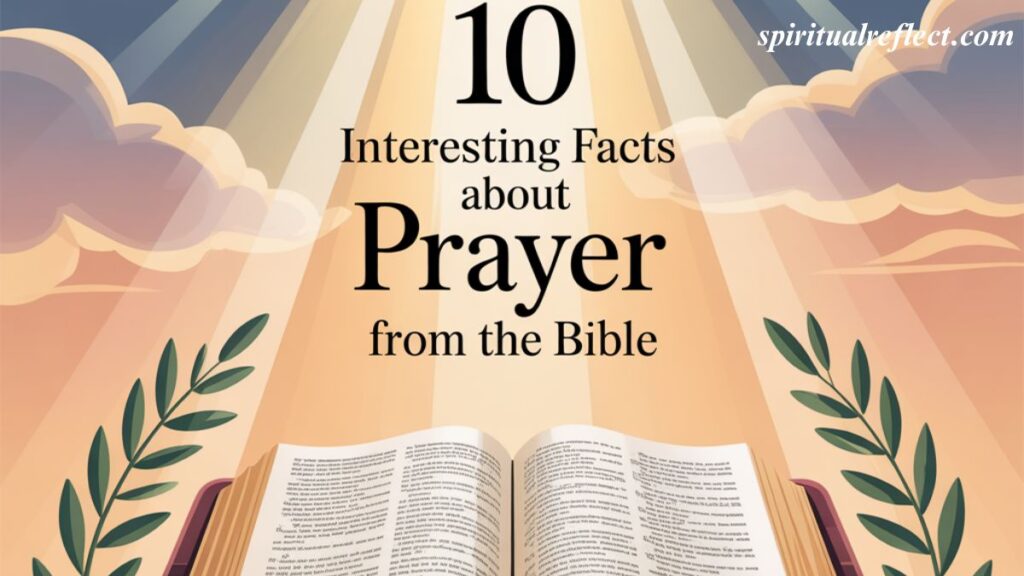10 Interesting Facts About Prayer from the Bible reveals the depth, diversity, and divine power of communication between humanity and God. Throughout Scripture, prayer appears as a sacred dialogue—words spoken from the heart, whispered in faith, or cried out in need. It’s more than ritual; it’s the living pulse of a believer’s relationship with God, shaping faith, guiding choices, and strengthening the soul.
From Genesis to Revelation, prayer threads through every major story, connecting kings, prophets, and ordinary people with divine purpose. The power of Elijah’s fervent plea, the gratitude in Solomon’s temple prayer, and the quiet moments when Jesus sought His Father all highlight how prayer changes lives.
These 10 Interesting Facts About Prayer from the Bible uncover hidden layers of meaning, timeless lessons, and spiritual insights that inspire believers today. Each fact invites reflection, offering wisdom to deepen faith and rekindle devotion.
Fact #1 — The First Prayer in the Bible Came from Desperation
The earliest recorded mention of prayer in Scripture comes in Genesis 4:26:
“At that time people began to call on the name of the Lord.”
Key points:
- This happened after the murder of Abel by Cain, suggesting that when humanity faced severe brokenness, they turned toward God.
- It wasn’t a formal ritual. It was people calling on God’s name—a raw, human response.
- From the get-go, prayer appears as authentic dependence, not just religious duty.
Take-away for you:
If you’ve ever felt helpless, you’re in good company. The first prayer recorded was born out of need. Let that free you from trying to get prayer “just right.” God honours the cry of a sincere heart.
Fact #2 — Abraham’s Prayers Shaped Nations
While the first prayer was general, later prayers had a wide-ranging impact. For example, Abraham interceded for the people of Sodom in Genesis 18:22-33.
Highlights:
- Abraham bargains with God: “What about if there are 50 righteous people… 45… 10?”
- His prayer isn’t just for his sake. He pleads for others—intercession in action.
- It reveals that prayer sometimes plays a role in divine mercy making.
Application for you:
Prayer doesn’t have to be selfish. It can extend to others, even to situations beyond your control. Think of someone or a community you care for—pray boldly and specifically.
Fact #3 — Moses Spoke to God “Face to Face”
The life of Moses offers a compelling picture of prayer: “The Lord would speak to Moses face to face, as a man speaks with his friend.”
What this shows:
- Prayer is intimate. It’s not always formal or distant.
- Moses didn’t hide questions, frustrations, or raw emotions.
- He brought the people’s needs and his leadership burdens into prayer.
What you can learn:
Allow yourself to bring everything into prayer—confusion, anger, hope. Honest communication with God deepens your relationship, shifts your heart, and aligns you with Him.
Fact #4 — King Solomon’s Temple Dedication Was a Prayer of Overflowing Gratitude
When Solomon dedicated the temple in 1 Kings 8 (also see 2 Chronicles 6), his prayer emphasized thanksgiving, humility, and God’s faithfulness, more than asking.
Key features:
- He acknowledges God’s covenant with his father David.
- He speaks of God’s dwelling among people.
- He expresses gratitude for the privilege of building the temple.
Why it matters:
Prayer isn’t only for asking. A strong prayer life includes gratitude, recognizing God’s past work and ongoing faithfulness. This builds trust and shapes your view of God’s character.
Fact #5 — The Psalms Reveal Every Human Emotion in Prayer
The book of Psalms offers a laboratory of human-heart prayers: praise, lament, confession, awe. For example:
- Psalm 51: David’s confession.
- Psalm 13: “How long, O Lord?”
- Psalm 139: Depth of God’s knowledge and presence.
What we learn:
- Your prayer life can include raw emotion. Feeling lost or overwhelmed doesn’t disqualify you.
- Humans and God meet in the messy middle of life—not just on mountain-tops.
- Prayer cultivates spiritual growth by being honest.
Table: Types of Prayer in the Psalms
| Type of Prayer | Example Verse | Key Emotion |
|---|---|---|
| Confession | Psalm 51 1-2 | Regret, pleas for mercy |
| Lament | Psalm 13 1-2 | “How long, Lord?” |
| Thanksgiving & Praise | Psalm 100 1-5 | Joy, acknowledgment |
| Awe / Wonder | Psalm 139 1-6 | Psalm 51 1 2 |
Fact #6 — Jesus Didn’t Just Teach Prayer—He Lived It
Jesus modelled prayer throughout His life. Consider:
- He withdrew early mornings to pray (Mark 1:35).
- He taught us the Lord’s Prayer (Matthew 6:9-13) as a blueprint.
- He prayed in critical moments: before selecting disciples, before the cross.
Why this matters:
Jesus shows us that prayer isn’t optional—it’s integral to living in tune with God. If He prayed, so should we. His prayers invite us into dependence and connection.
“Lord’s Prayer” Key Sections
- Addressing God as Father: a relationship.
- “Your kingdom come, your will be done…”: alignment with God’s plan.
- Daily bread, forgiveness, deliverance: practicality.
- Statement of God’s power: confidence.
Fact #7 — Persistent Prayer Was Central to the Early Church
Early believers didn’t just pray occasionally—they prayed consistently and together. Example: In Acts 1:14 and 12:5, believers gathered in unity and intercession. (
Insights:
- Shared prayer amplifies faith: “They prayed without ceasing.”
- Prayers preceded a miraculous turnaround (Peter’s prison release).
- Persistence and community go hand in hand.
How this applies:
Make prayer a regular rhythm—not a one-off. Join others in praying. Keep showing up even when you don’t feel the breakthrough yet. Faith often grows in the waiting.
Fact #8 — Paul’s Letters Overflow with Prayer
In many of his epistles, Paul writes opening lines of thanks, joy, and prayer (e.g., Philippians 1:3-4). He also exhorts believers: “Pray without ceasing.”
Highlights:
- Prayer is an ongoing mindset, not just a timed event.
- Paul prayed in chains, hardship, and ministry—testimony to how prayer sustains.
- He saw prayer as the key to spiritual endurance.
Practical application:
Let prayer be your default setting, not only when things get bad. Use simple anchors: a phrase, a scripture, a breath. Align your mind with God’s presence constantly.
Fact #9 — God Answers Repentant Hearts
The Bible connects answered prayer with humility, repentance, and a turning of the heart. Consider:
- 2 Chronicles 7:14 – “If my people… humble themselves, and pray…”
- Psalm 51 – David’s deep confession after his sin.
Core takeaway:
Prayer isn’t magic. It carries weight when the heart aligns:
- Acknowledge sin.
- Ask for forgiveness.
- Commit to change.
Quick checklist: Are your prayers shaped by:
- Honesty?
- Humility?
- Openness to transformation?
If yes, you’re in good company. If no, this fact invites a shift.
Fact #10 — The Holy Spirit Intercedes When Words Fail
In Romans 8:26-27, Paul teaches that the Holy Spirit “helps us in our weakness; for we do not know how to pray as we ought, but the Spirit himself intercedes with sighs too deep for words.”
Why this matters:
- When you’re overwhelmed, lost for words, broke in spirit—the Spirit steps in.
- Prayer is not limited to your words or your strength.
- It connects you to the divine help and guidance you might not see.
Application:
When you feel unable to pray, just sit. Breathe. Invite the Holy Spirit. Allow your heart’s groan to become part of prayer. Trust that the connection is real even when the words feel inadequate.
Bonus Insight — Prayer Doesn’t Always Change Circumstances, But It Changes Us
Sometimes the answer isn’t what we hoped for. Consider Paul’s “thorn in the flesh” (2 Corinthians 12:7-10) – repeated prayer, but God says, “My grace is sufficient for you.”
While the circumstance stayed, Paul’s character shifted. Prayer became the path of transformation.
Why we must remember this:
- Prayer isn’t a guarantee that things will go our way.
- It’s a guarantee that God is working, often through the process.
- It aligns hearts with His, helps us mature, and builds trust in His timing and wisdom.
Summary of Key Lessons
Here’s a quick recap of the core truths you’ve seen:
- Prayer begins in dependence and need.
- Intercession shifts perspective beyond self.
- Intimate communication (like Moses) invites authenticity.
- Gratitude matters (Solomon).
- Emotional honesty (Psalms) broadens prayer’s reach.
- Jesus models both teaching and living prayer.
- Community + persistence = power.
- Prayer as a habit fosters endurance (Paul).
- Humility opens doors (repentance).
- The Holy Spirit amplifies when words fail.
- Transformation often matters more than changed circumstances.
Practical Ways to Bring These Insights into Your Life
Here are actionable steps you can take this week:
- Start each day with one simple prayer: “God, I’m here. I need you.”
- Choose one person to intercede for every day.
- Journal your prayers for one week—honestly, emotionally.
- Adopt the Lord’s Prayer as a model: write your own version inspired by its structure.
- Join a prayer group (in person or online) and commit to praying together once a week.
- When you don’t know what to say, pause and ask the Holy Spirit.
- At the end of a difficult day, thank God for at least one thing—however small.
Table: Biblical Fact vs. Application
| Biblical Fact | Application in Your Life |
|---|---|
| First prayer born of need | Bring your real needs to God |
| Abraham’s intercession influences outcome | Pray for others and bigger purposes |
| Moses converses “face-to-face” with God | Pray with authenticity and vulnerability |
| Solomon shows thanksgiving in his prayer | Make thankfulness a regular part of your communication |
| The early church was persistent & communal | Abraham’s intercession influences the outcome |
| Jesus lived out prayer, taught it | Model your life after His posture of prayer |
| Psalms show a wide emotional range | Express joy, anger, grief, and hope in prayer |
| Paul prays without ceasing | Build a regular group-prayer habit |
| God responds to humble hearts | Align your heart with humility and openness |
| Holy Spirit intercedes when words fail | View prayer as an ongoing mindset, not only an event |
Quotes to Encourage Your Prayer Life
“Do not be anxious about anything, but in everything by prayer and supplication with thanksgiving let your requests be made known to God.” – Philippians 4:6
“Likewise the Spirit helps us in our weakness… the Spirit himself intercedes for us with groanings too deep for words.” – Romans 8:26
Conclusion
The 10 Interesting Facts About Prayer from the Bible show that prayer has always been the heartbeat of faith. It’s how people in Scripture spoke with God in moments of joy, fear, and hope. These stories remind us that prayer isn’t about perfect words but about honest hearts. Whether whispered in silence or shouted in desperation, every prayer matters to God.
Learning these 10 Interesting Facts About Prayer from the Bible helps believers understand that prayer connects heaven and earth. It changes how we see challenges and strengthens our trust in God’s plan. Through gratitude, repentance, and faith, prayer shapes our hearts and draws us closer to Him every day.
FAQs
1. What is the importance of prayer in the Bible?
Prayer opens a direct line of communication with God. It shows up repeatedly in Scripture as central to a believer’s faith, worship, and relationship with God.
2. Can prayer be silent or must it be spoken aloud?
Yes, prayer can be silent or spoken aloud. The Bible shows examples of both modes.
3. Does prayer always change circumstances?
Not always. While prayer sometimes leads to dramatic change, often its greatest impact is on our hearts and spiritual growth.
4. Who helps us pray when we don’t know what to say?
The Holy Spirit assists us in our weakness and intercedes for us when words fail.
5. How often should believers pray?
The Bible encourages ongoing communication with God—not just occasional pleas—making prayer a regular rhythm of life.

Rana Ahmad is the creator of Spiritual Reflect, where she shares insights on personal growth, mindfulness, and meaningful living to inspire a more intentional life.







